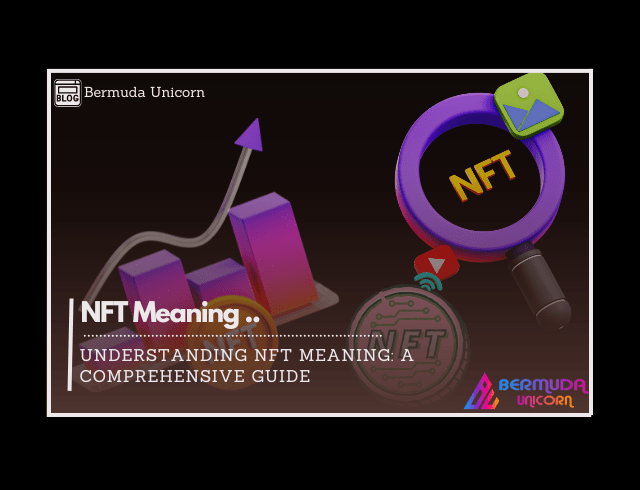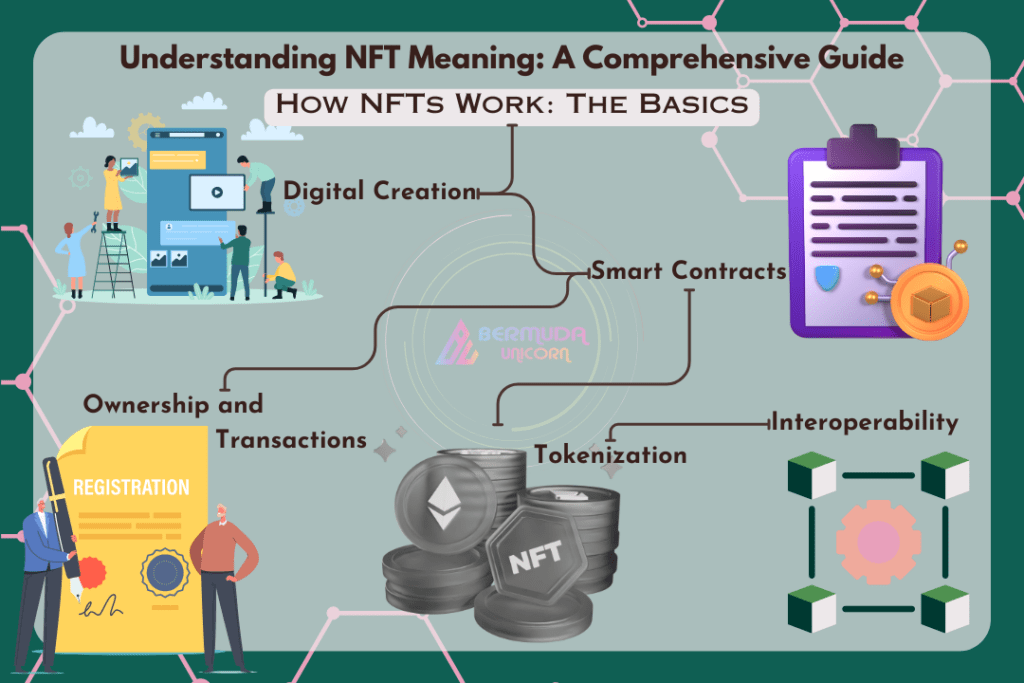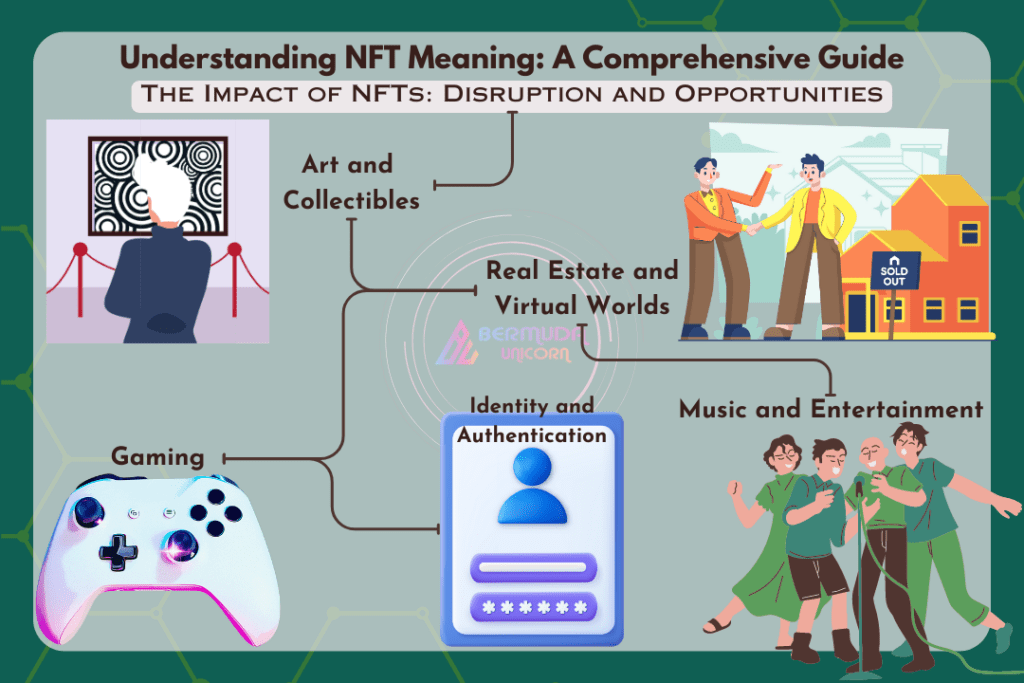![]()

In recent years, a new and intriguing concept called Non-Fungible Tokens (NFT Meaning) has revolutionized the world of digital art, collectibles, and ownership. Also, NFTs have stormed the art and entertainment industries, unlocking a realm of previously unexplored possibilities. So, This comprehensive guide seeks to demystify NFTs, delving into their definition, functioning, impact, and potential future.
Defining NFTs: Unpacking the Acronym
NFT stands for Non-Fungible Token. To understand its meaning, let’s break down the components:
– Non-Fungible:
A non-fungible item possesses uniqueness and cannot undergo a one-to-one exchange with another item. Also, For instance, cryptocurrencies such as Bitcoin demonstrate fungibility as they can be interchanged without any noticeable distinction. NFT Meaning – Conversely, non-fungible objects like art pieces exhibit individual qualities that differentiate them.
– Token:
In the context of blockchain technology, a token embodies a unit of value or ownership. Typically, these tokens find storage and management on a decentralized and secure digital ledger known as a blockchain.
By combining these two terms, you essentially get an NFT, which is a distinct digital token representing ownership or authentication proof of a particular item. Also, this item is often a digital artwork, collectible, music piece, video, or any other form of digital creation.
How NFTs Work: The Basics
NFTs rest upon blockchain technology, the foundation of cryptocurrencies such as Bitcoin and Ethereum. Blockchains are digital ledgers that are decentralized resistant to tampering, and responsible for recording transactions and ownership. This is how NFTs operate:
1. Digital Creation:
An artist or creator generates a digital item, ranging from a piece of art to a music album, video clip, virtual real estate, or even a tweet.
2. Tokenization:
The digital item undergoes tokenization, transforming it into a distinct digital asset on a blockchain. This asset becomes the NFT, functioning as a digital certificate of ownership and authenticity.

3. Smart Contracts:
NFTs commonly rely on blockchain platforms that uphold smart contracts, with Ethereum being a prominent example. Smart contracts are contracts that execute automatically, with their terms directly encoded into code. They empower automated functions like ownership transfers and royalty management.
4. Ownership and Transactions:
When someone purchases an NFT, the ownership is transferred to them and recorded on the blockchain. However, ownership can be easily verified, and transactions are transparent.
5. Interoperability:
NFTs find buyers, sellers, and traders on various online marketplaces that uphold their functionality. These marketplaces not only facilitate transactions but also offer a platform for creators and collectors to interact.
The Impact of NFTs: Disruption and Opportunities
NFTs have had a profound impact on several industries:
1. Art and Collectibles:
NFT Meaning has redefined ownership in the digital art world. Artists can now sell their work directly to collectors, eliminating the need for intermediaries. This has also opened new revenue streams for creators.
2. Gaming:
NFTs are altering the dynamics of in-game assets. Players can genuinely own their in-game items, and rarity can be preserved as items are traded between players. This also empowers players with more control over their virtual possessions.
3. Music and Entertainment:
Musicians and content creators can tokenize their work, enhancing their ability to maintain control and generate revenue from their creations. Additionally, royalties can be automatically distributed through smart contracts. This also eliminates potential disputes over payment distribution.

4. Real Estate and Virtual Worlds:
Virtual real estate and virtual worlds are emerging as new frontiers for NFTs. Ownership of virtual land and properties is becoming a reality. Additionally, these developments are reshaping how people perceive and interact with digital spaces.
5. Identity and Authentication:
NFT Meaning can be used to demonstrate ownership and authenticity of physical items as well, such as luxury goods and collectibles, by attaching a unique digital token to them. This also extends the potential applications of NFTs beyond purely digital assets.
Looking Ahead: Future Possibilities
The NFT space is evolving rapidly, and the future holds exciting possibilities:
– Cross-platform Interoperability:
NFTs from one platform might become usable in another, enhancing their utility.
– Environmental Concerns:
As the popularity of NFTs grows, there are discussions about their environmental impact due to the energy consumption of specific blockchains. Solutions are being explored to mitigate this issue.
– Legal and Copyright Challenges:
NFTs raise complex issues related to intellectual property rights and copyright ownership. Legal frameworks are adapting to address these challenges.
– Education and Adoption:
As NFTs continue to become mainstream, educating users about their benefits, risks, and technical aspects will be crucial.
Conclusion
Non-fungible tokens are reshaping how we perceive ownership, authenticity, and value in the digital age. As the technology and adoption evolve, NFTs have the potential to revolutionize industries beyond art and collectibles. However, this potential comes with challenges, as any emerging technology does. Careful consideration of their implications is necessary to ensure a sustainable and inclusive ecosystem for creators and consumers alike.
Frequently asked questions(FAQs):
Q1: What is Bermuda Unicorn’s role in the NFT space?
Bermuda Unicorn stands as a prominent NFT marketplace that acts as a central hub for artists, creators, and collectors to connect. It not only offers a platform for creators to tokenize their digital art, music, videos, and more but also enables them to reach a wider audience and maintain ownership control.
Q2: How does Bermuda Unicorn ensure the authenticity of NFTs?
Bermuda Unicorn utilizes blockchain technology to establish a secure and transparent environment. The transaction history of each NFT is recorded on the blockchain, guaranteeing authenticity and provenance.
Q3: What sets Bermuda Unicorn apart from other NFT marketplaces?
Bermuda Unicorn gains recognition for its user-friendly interface, simplifying engagement with NFTs for both newcomers and experienced users. Moreover, it nurtures a sense of community among creators and collectors, promoting interactions and collaborations.
Q4: Can artists and creators benefit from using Bermuda Unicorn?
Certainly. Bermuda Unicorn enables artists by giving them the capability to showcase and sell their digital creations as NFTs directly to collectors. This potential enhancement in earnings and the increased control over their artistic output are substantial benefits.
Q5: Is Bermuda Unicorn involved in any environmental initiatives?
Bermuda Unicorn, akin to numerous responsible platforms, acknowledges the environmental concerns linked with NFTs. The platform is actively exploring avenues to embrace blockchain solutions that are more energy-efficient.
